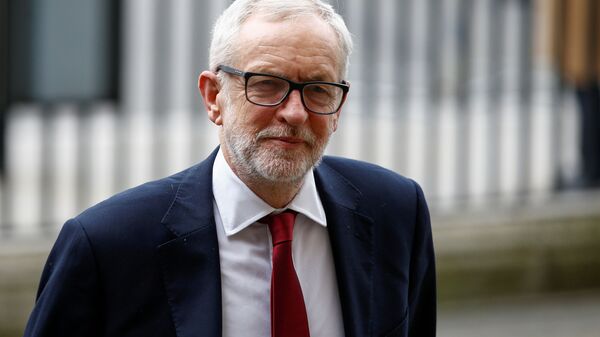Eric Shaw, senior lecturer in politics at Stirling University, believes that the move to suspend Corbyn will undeniably have some divisive effects in the Labour Party.
Sputnik: Do you think the suspension of Jeremy Corbyn was just?
Eric Shaw: Well, I would distinguish between two meanings of the word "just" - the first is whether it's consistent with the rules of the party, and Labour are a very rule-bound organisation with a huge number of rules, which it's constantly amending. But the interesting point here is that it has not been specified what rules that Corbyn has broken. The only thing which has been deduced is the statement he made on the anti-Semitsm report, that he thought anti-Semitism had been grossly exaggerated for political purposes, but that doesn't appear as a rule violation other than there is a formulation that you bring the party in to discredit, but that's not been noted.
However, Keir Starmer was one of the country's top lawyers, he must have thought this one through, so we may hear more about this. The second is just in terms of whether it's fair and consistent with natural justice. Here feelings are bitterly divided. I struggled to find that he committed an offence so serious that it warrants his possible expulsion from the party.
Sputnik: Do you think this decision to suspend Jeremy Corbyn will lose some Labour voters?
Eric Shaw: I think it's more likely to gain voters. Really, frankly, I know that this has been denied, and frankly this must be a consideration. This might be a factor why the suspension has occurred, because you can remember times in the past, say Neil Kinnock in the 1980s and Tony Blair in the 1990s were taking a tough and robust line against the left. There seemed to be a sort of demonstration of strong leadership and voters just like strong leaders. In addition, Starmer has been saying ever since he has been elected the party is under "new leadership" and I think he wants to ram that notion home.
And I can see again the electoral rationale for doing so, because although a portion of the electorate was very enthusiastic about Jeremy Corbyn, a substantially larger proportion strongly disliked him, and I think what Starmer would like to do is to draw some very, very clear lines on the sand.
Sputnik: Do you think this decision will divide the Labour Party?
Eric Shaw: Well, this is the big question, really, and that it will have some divisive effects is inevitable. The question is how much the institutions of the hard left, the Corbyn left, socialist campaign group of MPs, and Momentum have issued statements denouncing what has happened. And no doubt many of them are very angry, furious even, but it's very noticeable they seem to be terribly reluctant to appear on the radio or television. I kind of suspect there have been internal divisions in the party for some time. I think there’s a group which feels they can work with Keir Starmer, and John McDonnell might be an example of that, but there's a group who just are really desperate to get plunged into the fight regarding Starmer’s betraying the left-wing inheritance. But there’s also how the unions will react.
Len McCluskey’s angry statement has received publicity and a number of other unions have joined him in attacking the decision, but the majority of unions have not. They've kept very quiet and the unions really will prefer for the party to concentrate its energy on strong opposition to the government and rebuilding itself and they're really not going to go out and allow themselves to be distracted by this issue. So I think that the union voice may be angry at first, but that anger will dissipate; and the final group is the membership. There is a section of the membership, maybe 25% or maybe a little more, who were strongly pro-Corbyn and they will be in chronic indignation.
There's another group, smaller on the right, who are very enthusiastic, but the largest group is what I would call the soft left. They might feel a residual affection for Corbyn, for whom many of them voted a few years ago. But I think their loyalty to the present leader who many of them supported in the most recent election will be stronger. And so there’s absolutely no doubt amongst a group of the membership, they will become completely alienated and there will be furious opposition, but I don't think that group will encompass the whole of the Corbyn left, maybe only a minority of it.


